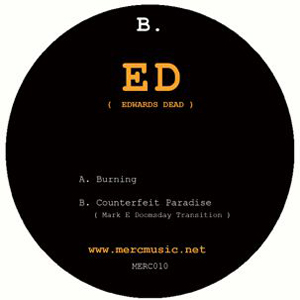ED “Burning” b/w “Counterfeit Paradise (Mark E Doomsday Transition)”
Life on the internet must be hard for mysterious artists with generic names. Take a […]

Life on the internet must be hard for mysterious artists with generic names. Take a look at Edward, the Merc-affiliated deep-house producer who recently changed his name to ED (a.k.a. Edwards Dead) to avoid being confused with another, better-established Edward, whose work falls loosely in the same vein. It seems a sensible move, as ED’s discography so far only consists of “Maxa” b/w “Naxa,” his loop-heavy and disco-laced debut, and “Burning” b/w “Counterfeit Paradise (Mark E Doomsday Transition),” his freshly released sophomore 12″, both via Mark E‘s Merc Music.
Yet, while ED’s name may have changed, his sound has stayed consistent, with a retro-inspired and futuristically oriented aesthetic reminiscent of other artists on the Merc roster. On “Maxa” b/w “Naxa,” he experimented with Moodymann-esque deep house, chopping up and then unraveling his samples into tracky pockets of rhythm and blues. “Burning” b/w “Counterfeit Paradise (Mark E Doomsday Transition)” mostly continues in this direction, presenting a strong, dancefloor-oriented a-side and a less impressive, but still solid leftfield b-side.
“Burning” picks up right where “Naxa” left off. It’s a reverb-saturated cut of deep house that picks up a sense of drive from cartoonishly active bongos and sharp hits cribbed from some obscure disco orchestra. A descending bassline rolls along in the background, pushing the track forward towards a collage of black voices. Clocking in at over eight minutes, its length works because of ED’s arrangement, as there’s enough push and pull to keep it interesting, with a building and almost hypnotic element. It’s the kind of track that’s tailor made for longer DJ sets, a good bridge that would work well between two more aggressive cuts.
With no original to judge it by, it’s hard to tell where ED’s work ends and Mark E’s mix begins on b-side “Counterfeit Paradise (Mark E Doomsday Transition).” The collaborative effort takes things in a darker direction, towards an almost gothic interpretation of Chicago house. Sounding fresh for 2012, its eight minutes are rendered via detuned vocal chants, glassy Oni Ayhun-style arpeggios, and the pixelated crashing of digital hi-hats. Compared to the a-side, it doesn’t stand up to its length, dragging a little towards the end. However, while it might not be as dancefloor-ready, it hardly detracts from the efficiency of the overall release. Instead, it rounds the whole thing out, providing a less bombastic option for those spaced-out moments that always seem to present themselves towards the party’s end.

